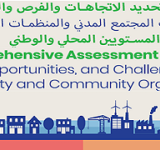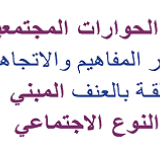Arab Middle Class: Measurement and Role in Driving Change

"This report,published by the Economic and Social Commission for Western Asia,aims to measure the region's middle class and its role in future development processes. The reoprt measures the Arab middle class by utilizing a specific definition that assigned middle class status to the economic group whose total expenditure lay above an appropriately defined poverty line,but whose expenditure on non-essential goods and services was less than the value of that poverty line. Another definition was applied to capture the middle class as a social group mainly engaged in professional occupations. This methodology,published separately in an ESCWA background paper entitled “A new approach to measuring the middle class: Egypt”,formed the basis of the analyses in the first two parts of this report.Three other background papers were also prepared as part of the present report,tackling the middle class from three distinct intellectual perspectives: historical,socioeconomic and political. By applying this methodology to household data from nine Arab countries,this report shows that middle class size remained stable in most countries from 2 to 21,with the exception of Egypt where the middle class shrank by nearly one third over that period. It also highlights how the conflicts in the Syrian Arab Republic and Yemen devastated the middle class and increased inequality after 21. However,more generally,the middle class has enhanced its capabilities as demonstrated by increased human capital,although the labour market has not rewarded its efforts. These stylized facts lend further substantive evidence and support to calls for a new Arab social contract and a more inclusive economic development model. To this end,the report argues that the middle class must spearhead development policy initiatives and that good governance and decent jobs should be the main vehicles of this new model,rather than hand-outs as was the case under the old social contract."


